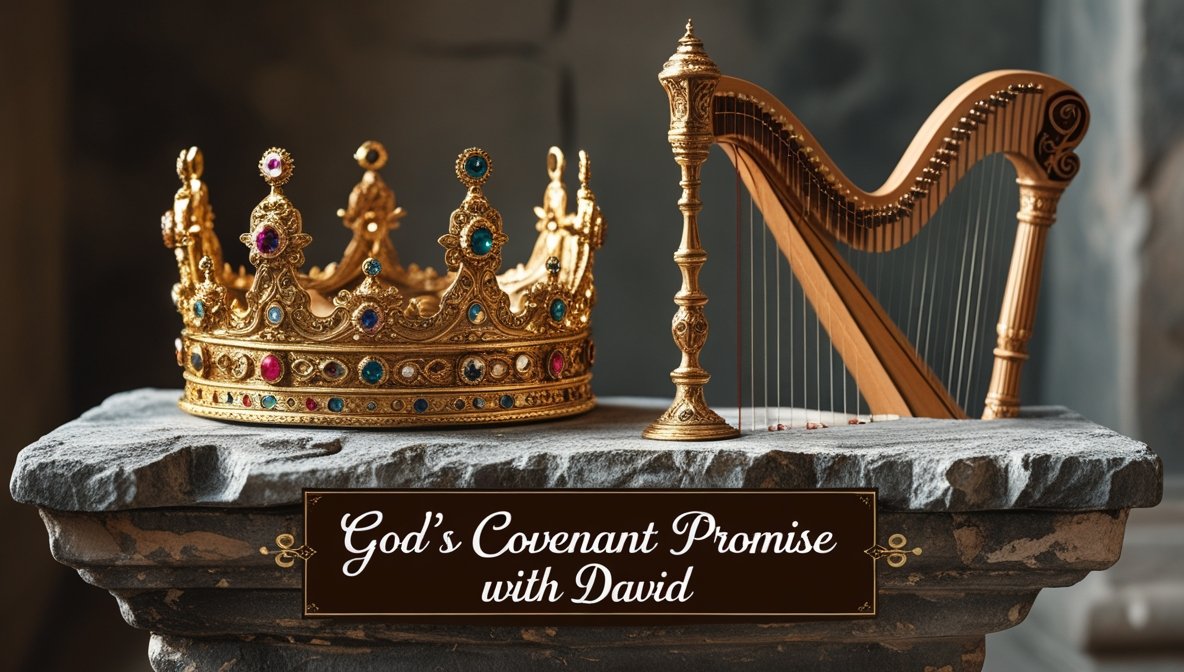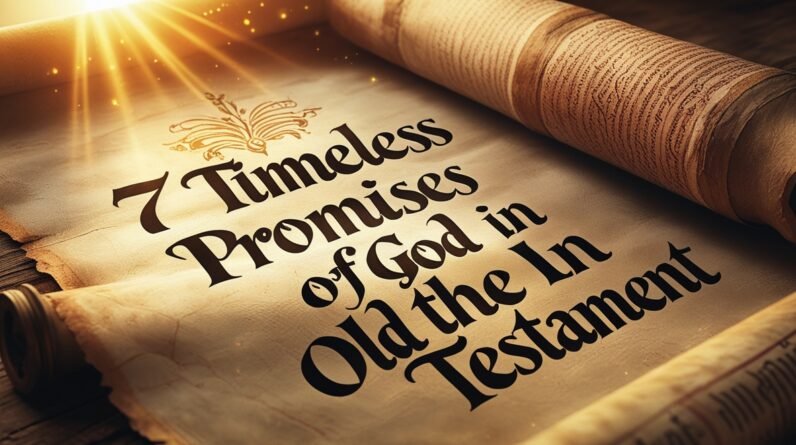God’s Covenant Promise With David
You’ve likely heard about God’s promises before, but the promise to David holds a special place in Scripture. It’s not just a historical footnote about an ancient king; it’s a living thread that ties Israel’s past to God’s unfolding future, reaches forward into messianic hope, and reaches inward to how you understand God’s faithfulness. In this article, you’ll walk through the historical setting, the content and contours of the covenant, how it’s interpreted across Scripture, and what 2 Samuel 7:16 means for you today. You’ll also find practical application and devotional reflections to help you live under the promise to David.
The Setting: David, the House, and God’s Plan
When you read the promise to David, you need to picture the scene. David has settled into his palace, feeling God’s blessing after years of struggle. He wants to build a permanent house for the Ark of the Covenant. Instead of granting David’s request, God — through the prophet Nathan — interrupts and gives David a different promise: God will build a house (a dynasty) for David that will endure. You can read the full promise in context at 2 Samuel 7:12-16 and the broader narrative at 2 Samuel 7:1-17.
This situates the promise to David in a personal, covenantal exchange. It wasn’t an abstract theological statement; it emerged from David’s relationship with God, tied to his kingship, and it set a theological trajectory for Israel’s expectations about kingship and God’s long-term purposes.
What the Promise Actually Says
You’ll want to zero in on the key lines. God promises that David’s offspring will sit on his throne, that God will establish his kingdom forever, and that God’s steadfast love won’t depart from David’s line. A pivotal verse is 2 Samuel 7:16, which succinctly summarizes the endurance of the promise: “Your house and your kingdom will endure forever before me; your throne will be established forever.” That single verse captures both the ancient function of kingship and a theological assurance that extends far beyond David’s lifetime.
As you read the passage, notice the mixture of personal promise (“your house”) and corporate consequence (the kingdom of Israel). The promise to David is both dynastic and national — it guarantees a line but also secures a people under God’s sovereign plan.
Key Themes in the Davidic Covenant
When you track the promise to David through Scripture, several themes stand out. First, there’s divine initiative: God chooses David and initiates a covenant that binds Himself to David’s line. Second, there’s permanence: the promise emphasizes endurance and a lasting throne. Third, there’s continuity with God’s promises to Abraham and the broader covenantal storyline. Fourth, there’s a messianic expectation: readers naturally look forward to an ideal ruler who fulfills the covenant perfectly.
You’ll see these themes echoed in other passages that recall or expand the promise, such as 1 Chronicles 17:11-14 and the poetic reflections in Psalm 89:3-4. Those passages help you understand how the promise to David functions as a theological hinge within the biblical canon.
2 Samuel 7:16 Application — What It Means for You
You asked specifically for an application of 2 Samuel 7:16. The verse reassures you of God’s long-term commitment. Practically, that means several things:
- It invites you to trust God’s promises, even when their fulfillment seems distant.
- It gives perspective when leadership or institutions fail; God’s ultimate purposes aren’t subject to human instability.
- It grounds your hope in God’s faithfulness rather than in transient success or decline.
So when you read “your house and your kingdom will endure forever before me,” apply it to your spiritual life: God’s redemptive plan persists. Even if you face setbacks, God’s faithfulness has a trajectory that includes restoration and fulfillment. This verse comforts you in times of uncertainty and calls you to participate in God’s ongoing work, confident that He is working out what He promised.
The Promise to David in Israel’s Poetic Memory
You’ll notice that Israel’s poets and prophets return again and again to the promise to David. Psalm 89 is one of the most explicit meditations on the covenant. It recalls God’s pledges and laments when reality seems to contradict the promise, then clings to God’s steadfast love as the anchor of hope. Read Psalm 89:3-4 to see the covenant language echoed: “I have made a covenant with my chosen one, I have sworn to David my servant…”
This shows you something crucial: the promise to David didn’t guarantee trouble-free success for his descendants. Rather, Israel’s writers used the promise as a theological lens to interpret national crises, exile, and hope. That lens encourages you to read your own disappointments in light of God’s ultimate promises.
Prophetic Expansion: Messianic Hope and the Throne
When the prophets speak, they often reframe the promise to David as part of messianic hope — the anticipation of a righteous ruler who fulfills God’s purposes. For example, Isaiah 9:6-7 ties an ideal ruler’s reign to “the throne of David,” extending justice and peace in a permanent way. Similarly, Jeremiah 23:5-6 and Jeremiah 33:17 prophesy a righteous “Branch” from David’s line who will reign wisely.
These prophetic expansions matter for you because they show how the promise to David becomes an instrument of hope in the midst of judgment and exile. The prophets use the covenant to say, “Even now, God has not abandoned his plan; the future holds restoration.”
How the New Testament Reads the Promise to David
If you want to follow the promise to David to its ultimate biblical fulfillment, you must step into the New Testament. The apostles and Gospel writers explicitly link Jesus to David’s line and present him as the one who fulfills the covenantal hopes. For instance, Matthew opens with a genealogy identifying Jesus as “son of David” (Matthew 1:1). Luke’s announcement to Mary explicitly promises that her son will inherit David’s throne forever (Luke 1:31-33).
Peter, in his sermon at Pentecost, ties David’s tomb and prophetic words to Jesus’ resurrection and ascension, arguing that God made good on his promise through the exalted Christ (Acts 2:29-36). You’ll find other echoes in the New Testament that show the early church reading Jesus as the climactic fulfillment of the promise to David.
Theological Tensions: Eternal Throne, Historical Reality
You might wonder: how can an earthly throne be “forever”? Scholars and pastors have wrestled with this. Part of your task as a reader is to recognize the layers of meaning. Historically, David’s literal dynasty did not rule forever in an uninterrupted political sense. But the covenant’s “forever” works on multiple levels:
- Permanence in God’s plan: God’s commitment to David’s line is an enduring promise, even when human kings fail.
- Typological fulfillment: David’s kingship foreshadows a greater, spiritual kingship fulfilled in the Messiah.
- Eschatological consummation: The ultimate “forever” is realized in the new creation, where God’s sovereign rule is final and unbroken.
Therefore, the promise to David is both immediate (addressing David’s dynasty) and horizon-reaching (pointing to a lasting kingship that transcends earthly limitations).

Covenant Theology and the Promise to David
If you’re exploring covenant theology, you’ll see how the promise to David fits within God’s broader covenantal network. It’s tied to the Abrahamic promises (land, seed, blessing) and to God’s covenant fidelity. When God promises David a lasting throne, that promise harmonizes with God’s pattern of choosing a people and a leader through whom blessings for the nations flow.
This means you can’t isolate the promise to David from God’s redemptive history. It’s a single strand of God’s bigger tapestry, knitting together past promise and future fulfillment.
The Promise and the Nature of God’s Faithfulness
A big takeaway for you is this: the promise to David showcases divine faithfulness. God doesn’t make a promise and then abandon it because human circumstances change. Look at how Scripture repeatedly returns to the covenantal language to reaffirm God’s commitment, even amid failure.
That pattern reassures you that God’s words aren’t ephemeral. When God commits, He’s anchored in character: mercy, steadfast love, and faithfulness. For your daily faith, that means you can rely on God’s long-term purposes much more securely than on immediate circumstances.
The Promise and Ethical Leadership
As you reflect on kingship, also consider ethics. The promise to David carries expectations: a king who rules according to God’s ways, who seeks justice and leads in righteousness. Prophets rebuked Israelite kings when they violated this ethic, and the covenant language presumes that the king’s role is stewardship under God.
For you, this translates into a model for leadership: authority is responsibility. Whether you’re a formal leader or someone influencing others, the promise to David encourages humility, accountability, and a commitment to justice — not a license for domination.
The Promise to David and Messianic Identity: Jesus as Fulfillment
When you trace the promise to David forward, you arrive at the heart of Christian hope: Jesus as the Messiah who fulfills the covenant. The New Testament argues that Jesus’ life, death, resurrection, and ascension vindicate the promises made to David. Read Acts 2:29-36 and Luke 1:31-33 to see how the early church articulates this fulfillment.
For you, this means the promise to David isn’t just about dynastic continuity; it’s about ultimate restoration in Christ. Jesus embodies the righteous rule the prophets longed for and inaugurates the kingdom of God in a way that fulfills the covenant’s deepest meaning.
Diverse Interpretations: Jewish and Christian Perspectives
You’ll encounter different ways communities understand the promise to David. Jewish tradition often emphasizes the future restoration of Davidic rule in a political sense, focusing on Israel’s national hope. Christian tradition tends to interpret the promise christologically, seeing Jesus as the decisive fulfillment who inaugurates the eternal kingdom.
Both perspectives bring valuable insights: the Jewish emphasis on national redemption highlights the political dimensions of the promise, while Christian readings emphasize the spiritual and cosmic realization of God’s reign. As you study, let these perspectives enrich your understanding without forcing an all-or-nothing choice.
Practical Spiritual Lessons From the Promise to David
Now, let’s make the promise to David practical. How does this ancient promise shape how you live?
- Hope in the long view: You’ll be less shaken by short-term setbacks when you embrace God’s long-term faithfulness.
- Stewardship of influence: Whether you lead a family, church, or workplace, you should model godly authority rooted in service, not self-interest.
- Commitment to justice: A kingdom promise calls you to pursue justice and mercy in tangible ways.
- Trust amid failure: When institutions or leaders fail, you remember that God’s purposes persist beyond human flaws.
These lessons turn doctrine into discipleship. The promise to David becomes a resource for resilience, ethics, and hope.
How to Pray with the Promise to David in Mind
Prayer shaped by the promise to David is both worshipful and expectant. You can:
- Thank God for his faithfulness across generations.
- Pray for leaders to embody the righteousness and justice implicit in the covenant.
- Ask for personal patience and endurance as you wait for God’s promises to be realized.
- Pray for the church to be a foretaste of the kingdom Jesus brings — a community that models justice, mercy, and steadfast love.
Praying this way draws you into the covenantal story. It helps you participate in God’s ongoing work rather than simply observing it from the sidelines.
Pastoral and Communal Implications
If you’re part of a church or community, the promise to David has implications for how you understand leadership, worship, and mission. It reminds you to keep Christ at the center of authority and to resist conflating political power with spiritual legitimacy. The covenant encourages communities to prioritize obedience to God’s commands and to cultivate practices that reflect the kingdom values foreshadowed in David’s promise.
For pastors and leaders, the promise to David can be a caution against claiming divine sanction for personal agendas. Instead, it should inspire leaders to embody servant leadership modeled on Christ, the true Davidic King.
Common Questions You Might Ask
You’ll probably have a few questions as you digest this material. Here are a few common ones with brief answers.
- Doesn’t the promise mean a literal, unbroken Davidic monarchy? The promise is complex: historically, David’s line didn’t rule unbroken, but the covenant’s ultimate “forever” is fulfilled in an eschatological and messianic sense (see Matthew 1:1 and Luke 1:31-33).
- Is the promise conditional? While God’s side is presented as faithful and irrevocable, Israel and its kings were often judged when they failed morally. The covenant contains both assurance and moral expectations (see Psalm 89:30-37 for a poetic reflection on divine fidelity and discipline).
- How does Jesus fulfill the promise? Jesus is presented as David’s descendant who inaugurates God’s eternal reign through his life, death, and resurrection — the heart of the New Testament’s claim (see Acts 2:29-36).
These questions help you think critically about what “forever” and “kingdom” mean in both ancient and contemporary frames.
Reflection: Living in the Light of the Promise
You don’t study the promise to David merely to increase knowledge; you let it shape your life. The covenant invites you to live with hope, responsibility, and faithfulness. It points you toward a King whose reign embodies justice and mercy and who calls you into participation in his kingdom work.
Meditate on 2 Samuel 7:16 and let its assurance steady your heart. Remember that God’s promises are not dependent on your perfect performance but on His unchanging character.
Final Thoughts: Why the Promise to David Still Matters
In a world of rapid change and fragile institutions, the promise to David is an enduring theological anchor. It grounds your hope in God’s covenant loyalty and points you to the consummation of God’s purposes in Christ. It shapes how you read Scripture, how you pray, and how you lead.
So when you think about legacy, leadership, and long-term faithfulness, return to the promise to David. It reminds you that God’s story is bigger than any setback and more faithful than any human promise. The throne may have been a royal seat in David’s time, but its true meaning is fulfilled in the reign of the Messiah, where God’s justice and mercy reach their intended climax.
If you want to go deeper, read the primary texts we’ve referred to: 2 Samuel 7:1-17, Psalm 89:3-4, Isaiah 9:6-7, Jeremiah 33:17, and New Testament passages like Luke 1:31-33 and Acts 2:29-36. They will help you see how the promise to David is woven throughout Scripture.
Explore More
For further reading and encouragement, check out these posts:
👉 7 Bible Verses About Faith in Hard Times
👉 Job’s Faith: What We Can Learn From His Trials
👉 How To Trust God When Everything Falls Apart
👉 Why God Allows Suffering – A Biblical Perspective
👉 Faith Over Fear: How To Stand Strong In Uncertain Seasons
👉 How To Encourage Someone Struggling With Their Faith
👉 5 Prayers for Strength When You’re Feeling Weak

📘 Jesus and the Woman Caught in Adultery – Grace and Mercy Over Judgement
A powerful retelling of John 8:1-11. This book brings to life the depth of forgiveness, mercy, and God’s unwavering love.
👉 Check it now on Amazon 🛒💥
🔥 “Every great message deserves a home online.” 🌍💬🏡
Don’t let your calling stay hidden. Start a Christian blog or website using Hostinger — with 99.9% uptime, a free domain, and SSL, your voice can shine for God’s glory anytime, anywhere.
💥 Begin today. 🛒 Try it RISK-FREE! ✅
✝️ “Your body is God’s temple — care for it with purpose.” 💪💖🏛️
Renew your energy and restore balance naturally. Mitolyn helps support a healthy metabolism, giving you the vitality to live out God’s calling with strength and confidence.
🔥 Unlock Your Metabolic Power! ⚡Burn More Calories & Feel Great With Mitolyn. 💪
👉 Start Today. 🚀 Check Price Now. 🛒💰
💰 As a ClickBank & Amazon Affiliate, I earn from qualifying purchases.
📖 Acknowledgment: All Bible verses referenced in this article were accessed via Bible Gateway (or Bible Hub).
🚀 Want to explore more? 👉 Dive into our new post on Why Jesus? and experience the 🔥 life-changing truth of the Gospel!








